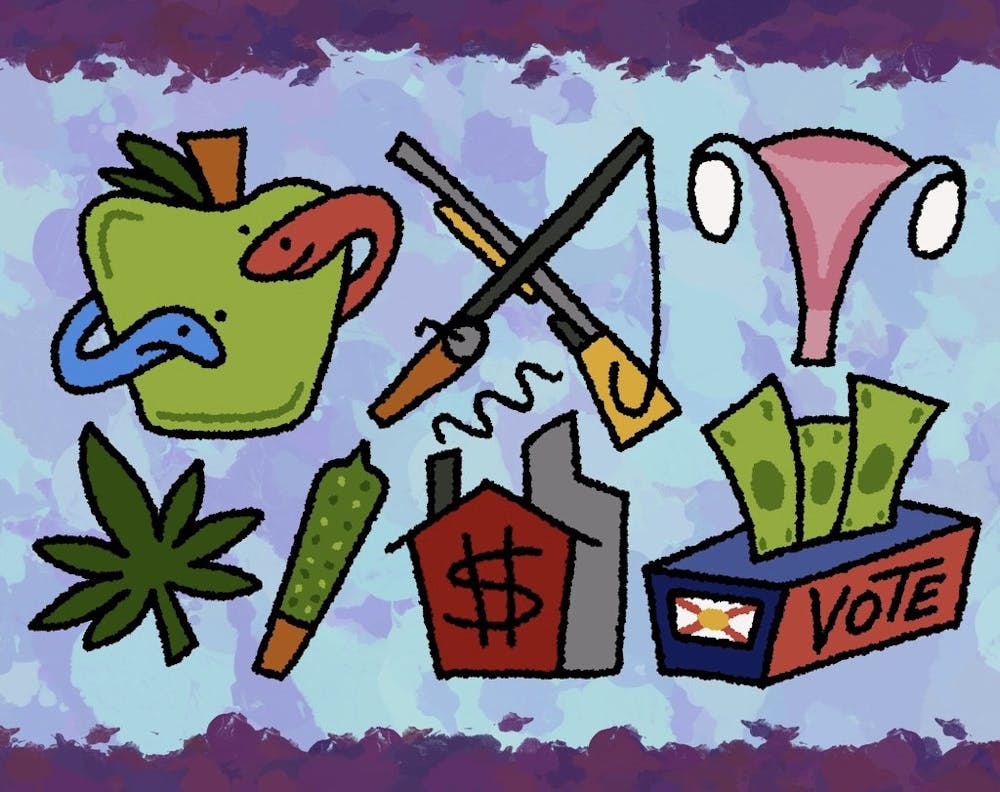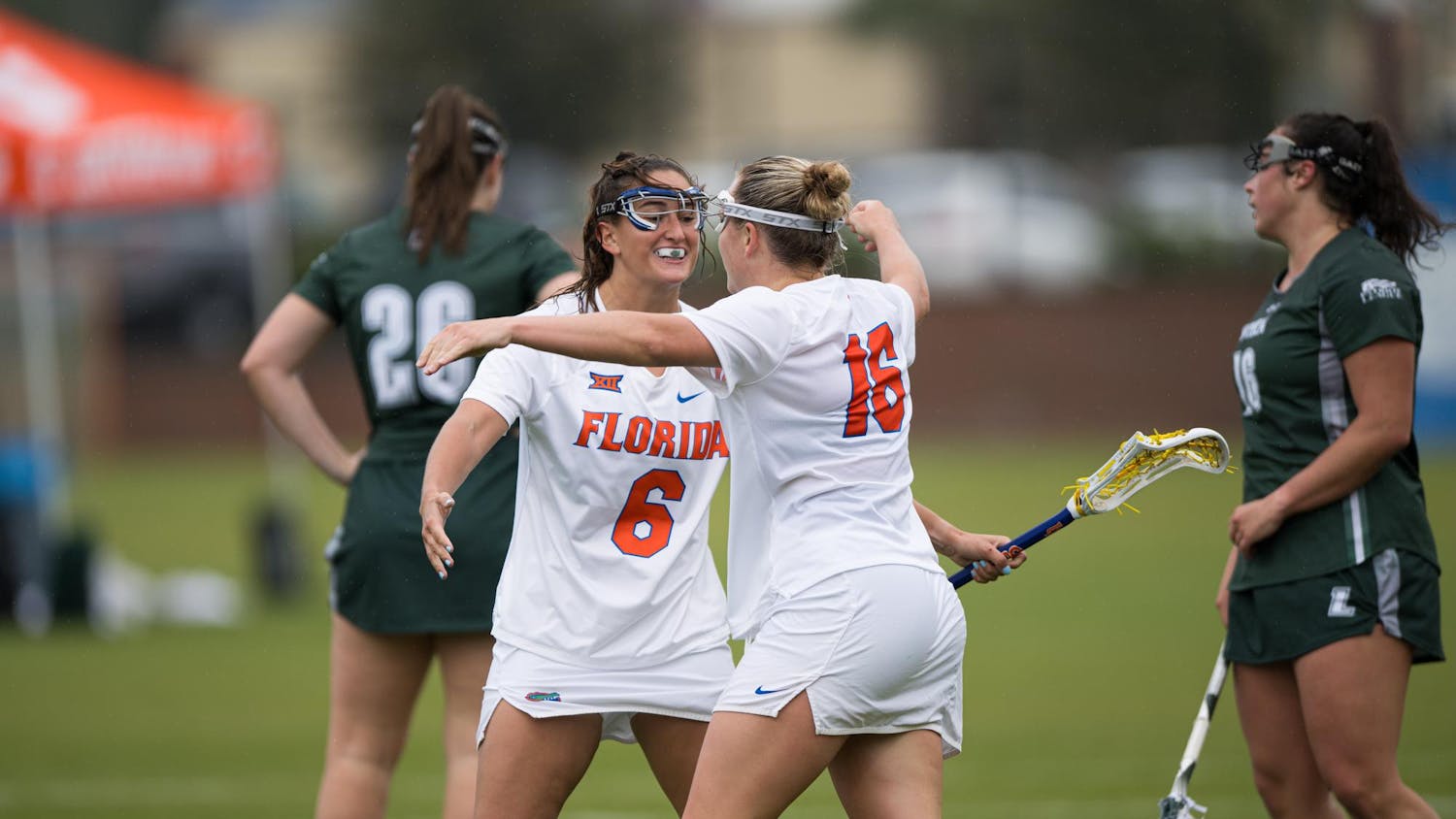Early voting in Alachua County started on Oct. 21 for the 2024 presidential election. From dynamic candidates at the top of the ticket down to local sheriff races, this year’s election will have far-reaching impacts across Florida.
However, one important and often confusing part of this year’s election cycle is the six constitutional amendments that voters can decide on. Each amendment must meet a threshold of over 60% approval from voters to pass.
If approved, these amendments would become a permanent part of Florida’s state constitution and could not be bypassed by any act of legislation.
Despite being non-partisan amendments, voters across Florida stand divided on each issue.
Amendment 1
If passed, Amendment 1 would make all school board elections partisan races from the 2026 election cycle onward. Currently, it is up to the discretion of each individual county whether or not to bring politics into the board by making candidates list their political affiliations.
In Alachua County, school board races are currently non-partisan.
School board seats are already politicized enough without bringing party affiliation into races, said Alachua County League of Women Voters President Janice Garry.
“Schools and education of our students is not a partisan issue, and it should not be made partisan by having candidates represent a specific party,” she said.
However, the sponsor of the amendment, State Rep. Spencer Roach (R-Fort Myers), said the purpose of the bill is not to bring politics into the classroom but rather to educate voters on who the candidates on the board are.
“For me, it’s about transparency, and I simply believe that we have an obligation to give voters as much information about a candidate as possible and let them make a decision about vetting a candidate,” he said in a statement to the Florida House panel in 2023.
Roach’s office did not respond for comment in time for publication.
Amendment 2
If passed, Amendment 2 would provide a constitutional right to hunting and fishing. The amendment states that fishing and hunting would become the preferred method for “responsibly managing and controlling fish and wildlife" and "shall be preserved forever as a public right."
Fishing and hunting regulations are currently set by the Florida Fish and Wildlife Conservation Commission.
Amendment 2 will secure Floridians' right to hunt and fish by enshrining it into the Constitution, said Ed Penny, the director of public policy education at Ducks Unlimited Southern Region. Ducks Unlimited is a national, non-profit organization that does habitat restoration in wetland territories.
The amendment makes sure that future generations have the opportunity to enjoy the outdoors through fishing and hunting, Penny said.
“In Florida, hunting and fishing is a strong part of many citizens' heritage,” he said. “It's something to be proud of. It's something to protect.”
However, some voters find the wording of the amendment troublesome. In a constitutional amendment, every single word is important, NoTo2 Chairman Chuck O’Neal said.
The amendment is not a citizen initiative, O’Neal said, meaning the wording of the amendment did not have to be approved by the Florida Supreme Court. Some words like “traditional methods” used in the amendment were left undefined, which could cause problems with ambiguity when setting future regulations.
O’Neal said he also has concerns over whether the hunter’s constitutional right will supersede private property laws. If hunters pursue game into someone’s backyard, O’Neal said, it could create a dangerous situation.
“This will preclude those property owners from calling the police and having the hunters removed off their property because the hunters will have a constitutional right,” he said.
Amendment 3
If passed, Amendment 3 allows for adults 21 years of age or older to possess, purchase or use marijuana products recreationally. The amendment would allow recreational possession of up to three ounces.
The amendment gained ballot access after being approved by the Florida Supreme Court on April 1 and acquiring over 1 million voter signatures. Marijuana is only currently legal in Florida for medical use.
Zane Menendez, a 19-year-old UF political science senior, said he’s in favor of Amendment 3. Marijuana-related charges disproportionately affect Black populations, Menendez said, and Amendment 3 would cut down on over-policing. If marijuana were regulated by the government, he said, there would be fewer illegal drugs in circulation.
“Amendment 3 would provide a safe, reasonable way for… people across the state to have a regulated product,” Menendez said. “Something that's tested, something that goes through the channels, that is safe for everybody.”
Opponents of the amendment say that even with regulation, marijuana would still pose risks. Black markets for weed would still flourish, Keep Florida Clean Director of Advocacy Jessica Spencer said. People will want to get marijuana for cheaper prices, she said, so illicit markets will continue for cheap fixes.
Spencer said she also worries about the possibility of public smoking not being regulated due to the vagueness of the amendment’s language.
“The language has to be consistent with the amendment,” she said. “If a ban was put into place [on public smoking] either by a local municipality or the state itself, it would not be consistent with the language of the amendment.”
Amendment 4
If approved, Amendment 4 would allow abortion up until fetal viability, which most healthcare professionals say is around 24 weeks. The amendment would overturn the current Heartbeat Protection Act, which bans almost all elective abortions after the six-week mark, with exceptions of up to 15 weeks for cases of rape or incest.
The referendum received over 900,000 signatures in support and was approved by the Florida Supreme Court before gaining ballot access.
Women with unintended pregnancies are often removed from the workforce, said Janice Garry, President of the Alachua County League of Women Voters. Women are forced to prioritize the welfare of their children over their jobs and even political careers, she said.
“The league's position is that abortion is a health care service,” she said. “It has been performed safely for a very long time, and it is not a government decision. It is a decision between a woman and her doctor.”
However, across Alachua County, the Vote No on 4 campaign has held vigils and ran virtual campaign ads marketing the amendment as “deceptive and extreme.” Proponents of the Vote No on 4 campaign say the amendment will open the door for late-term abortions and eliminate parental consent in minor abortion procedures.
The Vote No on 4 campaign did not respond in time for publication.
Amendment 5
If approved, Amendment 5 would add an inflation adjustment to the homestead tax exemption.
In Florida, property tax rates are currently mandated by counties, school districts, cities and special districts. Homes in Florida are assessed at their market value, with the homestead exemption subtracted, according to Ballotpedia.
The homestead exemption makes every primary residence eligible for up to $50,000 in exemption from all taxes except school district taxes. This means for a house that is $300,000, property taxes will only be paid on $250,000 of the home’s value.
However, for non-school taxes, the amendment would provide for an annual inflation adjustment for the value of the homestead property tax exemption. This adjustment would be recalculated every year on Jan. 1 based on the percent change in the consumer price index, which analyzes inflation annually.
No proponents or opponents of the amendment responded for comment in time for publication.
Amendment 6
If passed, Amendment 6 would end Florida’s public campaign financing program. The program currently provides an incentive for candidates to agree to election spending limits by providing public campaign financing for statewide elections.
In order to qualify for the public campaign financing program, a candidate must be running in a contested race for governor or an elected cabinet member and agree to expenditure limits.
The Alachua County League of Women Voters is against Amendment 6 because the public campaign financing program is needed, President Janice Garry said. The program helps candidates who may not have enough money to pay for a campaign compete against those who do, she said.
“We feel that continuing public financing for candidates levels the playing field and allows more people to participate as candidates and leadership,” Garry said.
Sen. Travis Hutson (R-Palm Coast), who helped sponsor the amendment, told the Senate Committee on Ethics and Elections in January that the decision should be put to the voters.
“I think it's absurd that anybody would be able to use taxpayer dollars for the purposes of campaigning,” he said.
Hutson’s office did not respond in time for publication.
Contact Morgan Vanderlaan at mvanderlaan@alligator.org. Follow her on X @morgvande.
Morgan Vanderlaan is a second year political science major and a Spring 2025 metro general assignment reporter. She has previously worked on the enterprise desk as a political reporter and on the county and city commission beat. When she's not on the clock she can be found writing, reciting and watching theatre!






